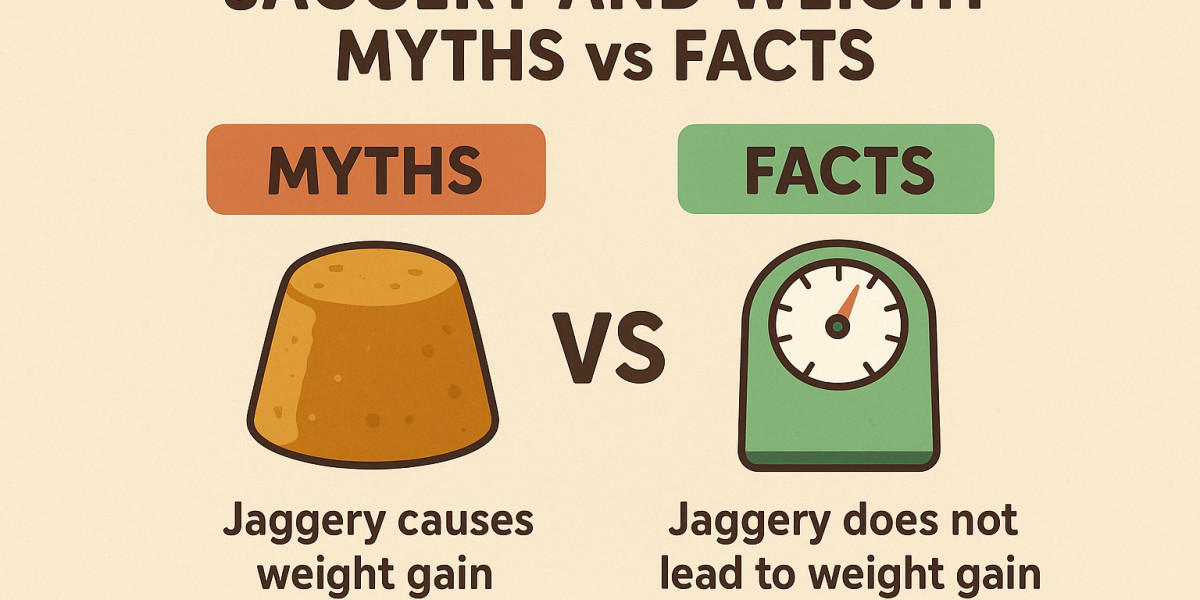Gur, commonly known as jaggery in India, has become popular in recent years as one of the natural sweeteners and as a healthier substitute for refined sugar. Jaggery is an unrefined product made of sugarcane or date palm sap, and is high in mineral levels, including iron, magnesium, and potassium. However, is jaggery actually beneficial in the area of weight management? Either or is just another sweet myth? Let us get the myths and facts apart. And understand, does jaggery increase weight or help with weight loss?
Myth 1: Jaggery is a Superfood that helps weight loss.
Among the most prevalent myths, it is assumed that jaggery will automatically cause a reduction in weight in case of its substitution for sugar. Although jaggery has more nutrients than refined sugar, it is also high in calories. Approximately, one teaspoon of jaggery has the same number of calories as sugar-15 to 20 calories.
✅ Fact:
Jaggery is not a wonder weight loss food. When taken in large amounts, it may add to weight gain in a similar way to sugar. The key lies in moderation.
Myth 2: Jaggery Purifies the Body and Helps in Digestion
Conventional customs tend to relate jaggery to body cleansing. It is thought to expel toxins and enhance digestion which they attribute to more effective weight control.
✅ Fact:
Jaggery does aid digestion to a certain degree and can prevent constipation because it has a mild laxative effect. It is also a source of antioxidants, which could aid detoxification. But its effectiveness in direct weight loss is low. It can help in general metabolism at best, and it cannot substitute a balanced diet or physical activity.
Myth 3: Jaggery Can Be eaten without limitations
Because jaggery is natural and contains many nutrients, most individuals believe that they can eat as much of it as possible without worries about health consequences.
✅ Fact:
This is misleading. Jaggery remains a type of sugar with a high glycemic index (GI), which implies that it can easily increase blood sugar levels. Excessive consumption not only poses a problem in weight management but also creates a possibility of diabetes and obesity. A regulated dosage of 1- 2 teaspoons/day is usually safe in most individuals.
Myth 4: Jaggery is Just Full of Empty Calories, such as Sugar
In contrast to refined sugar, jaggery has a low level of iron, magnesium, potassium, and B vitamins. Some claim that these nutrients make it more preferable in weight loss.
✅ Fact:
Jaggery is richer nutritionally than white sugar, but the proportions are low in comparison with everyday nutritional requirements. Although it is a healthier option compared to refined sugar, it must not be confused with a weight-loss supplement that contains nutrients.
Balanced Perspective: The use of Jaggery to get better health
Reuse, do not overload: Use the jaggery instead of sugar in tea, coffee or desserts to add sweetness, rather than adding more.
Eat in portions: Take in small portions-- consider it a seasoning, not a staple.
Eat together with healthier foods: Eat jaggery with nuts, seeds or whole grains to have improved satiety and sugar spikes.
Pay attention to general health lifestyle: The keystones of healthy weight management are exercise, water, and proper meals.
Final Thoughts
Jaggery is surely healthier than refined sugar; it has extra minerals and some digestive advantages. Nevertheless, it is not a diet aid. Jaggery is a sugar form that still serves as a sugar, and therefore, the myths about it tend to overestimate its advantages.
Jaggery can even be included in a well-balanced diet as long as it is consumed thoughtfully, and can more easily reduce sweet cravings. But weight control is achieved through long-term lifestyle decisions- not relying on any one kind of food.










